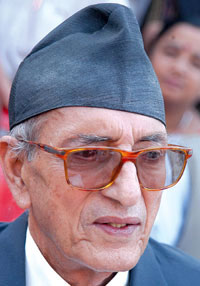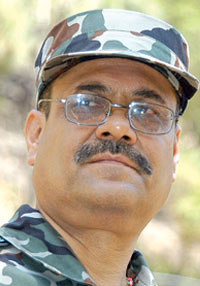On 13 May, a day after the Rayamajhi commission recommended the suspension of the security chiefs, Chief of Army Staff General Pyar Jung Thapa and seven other top ranking army officers visited Prime Minister Girija Prasad Koirala to express their dissatisfaction with the government's action. How a recorded tape of the meeting was leaked is still unknown.  Prime Minister Girija Prasad Koirala: Tell me, what can I do?
Prime Minister Girija Prasad Koirala: Tell me, what can I do?
Chief of Army Staff: The immediate suspension of the three security chiefs by the cabinet has reduced the morale of the security forces. No government in the world treats its forces like this.
Deputy Prime Minister KP Oli: Even though the commission had recommended that we also suspend the army chief we did not do that. In reality, the government has not thought of the army otherwise. This is your misunderstanding.
Lieutenant General Katuwal: Vice-premier, I will interrupt you. Ideologically we agree with you but this has not been seen in practice.
PM: No, it's not like that. You have to help the government brought by the people's movement. I urge you to do so.
COAS Thapa: You are politicians and that is why you look at the security forces through a political lens. But the security forces do not follow politics. Our main responsibility is the security and welfare of the people of the country, lasting peace and preservation of the sovereignty and boundaries of the state. We do not agree with your policy to take action against officers and soldiers of the security forces. The cabinet not taking the security forces into confidence could have adverse effects. You have to think seriously about this.
LG Katuwal: You suspended three chiefs of security. But why did you not suspend COAS Thapa? I may not ask you for an answer but the people surely will. What will you say then? You knew that we had a unified command security force under which the army, armed police, Nepal police and the investigation department worked together. By suspending all the chiefs except the army chief it looks like you are trying to break the unified command.
Home Minister Krishna P Sitaula: No, no. You must not think in this manner. The Maoists are trying to come to the mainstream. Our efforts are also aimed at that and all the security forces must help the government in this effort.  COAS Thapa: We, non-political entities, are being pushed towards politics. This is creating a difficult situation for us. As chief of the army staff, I will say that the security forces always were, are and will be united in its objective. The Royal Nepali Army is the oldest institution in the country. The current move to change its chain of command is extremely wrong.
COAS Thapa: We, non-political entities, are being pushed towards politics. This is creating a difficult situation for us. As chief of the army staff, I will say that the security forces always were, are and will be united in its objective. The Royal Nepali Army is the oldest institution in the country. The current move to change its chain of command is extremely wrong.
LG Katuwal: Security forces operate on the basis of a chain of command. This chain is intact and will remain so. Some people seem to have the intention to break it but it seems they have not understood the character of the Royal Nepali Army.
PM Koirala: I understand the COAS. You can remain assured that this will not happen. These sorts of problems occur during the transition period and must be solved. We will help you in this.
COAS Thapa: The people only revolted to bring peace. Talks that will divide the country even before the election for a constituent assembly frames a constitution should not be made. The people will make the constitution that they want-only they have the mandate to do so. The movement has only given you the mandate to establish peace, you must work accordingly.
DPM Oli: We have analysed the situation seriously. We respect your sentiments. We also have to fulfil the expectations of the people. The country is on the brink of division. The political parties also have the responsibility to save the country from being a failed state, to stop anarchy and division.


